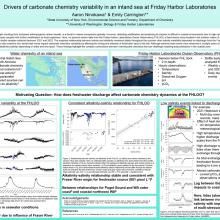Drivers of carbonate chemistry variability at Friday Harbor Laboratories
Aaron
Ninokawa
SUNY, College of Environmental Science and Forestry
Poster
Ocean acidification, the lowered pH resulting from increased anthropogenic carbon dioxide, is a threat to marine ecosystems globally. However, detecting acidification and predicting its impacts is difficult in coastal environments due to high natural variability driven by the mixing of marine and terrestrial inputs coupled with further modification by local organisms. Here, we present sensor data from the Friday Harbor Laboratories Ocean Observatory (FHLOO), a fixed sensor array located in the surface waters of the central Salish Sea in Washington state, combined with bottle samples collected between 2021 and 2023. The empirical relationship between salinity and alkalinity remained stable throughout the summer when salinity variability depended on discharge from the Fraser River. Because of the robustness of this relationship, we also examine how aerial heat waves impact carbonate chemistry variability by affecting the timing and intensity of freshwater input to the site. Although extreme heat events were observed in multiple years of the dataset, there were variable consequences for local alkalinity (salinity) depending on tides and snowpack. These findings highlight the complex connections between warming and chemistry that can challenge modeling and predictions in the coastal zone.

Poster file
Ninokawa-Aaron-poster.pdf
(1.22 MB)
